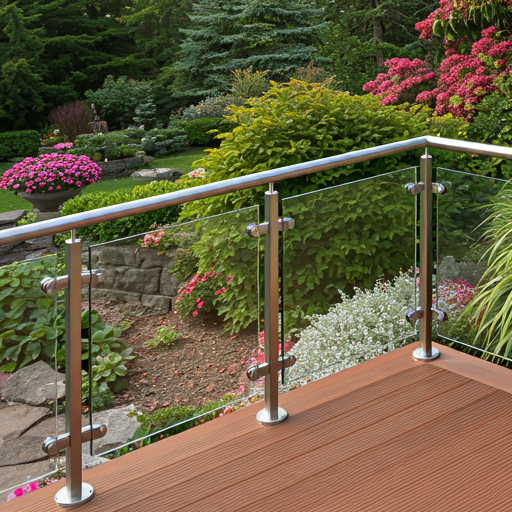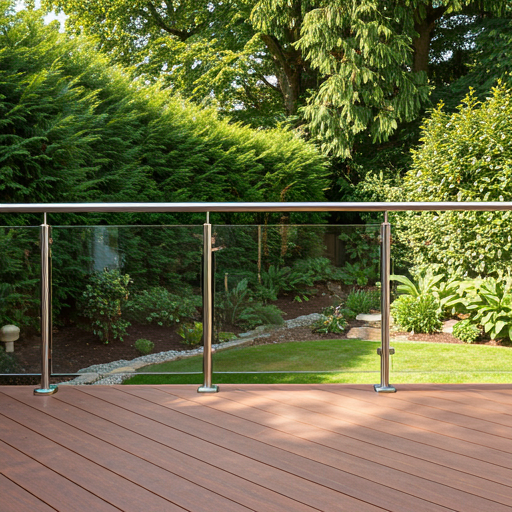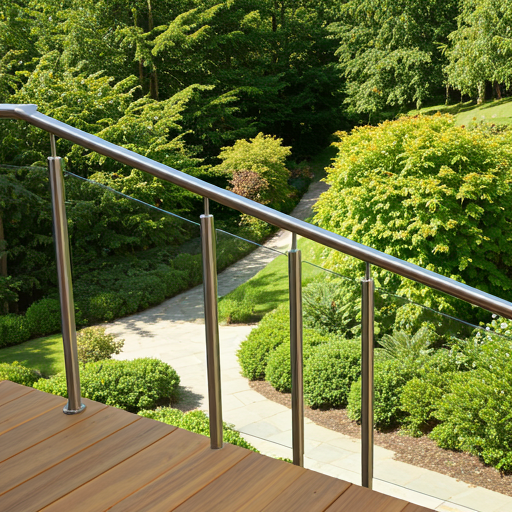Deck stair rails are crucial when designing or renovating your outdoor area. These railings improve the appearance of your deck and make it safer. This comprehensive tutorial will cover various topics related to deck stair railings, such as multiple fascia installation methods, adhering to construction requirements, and weight concerns.
The significance of deck stair railings
Railings on deck stairs are crucial. Assist others in climbing and descending stairs. This reduces the possibility of someone slipping and falling. Railings provide a secure grip when moving from one level of your outdoor space to another. Families with small children or elderly members should pay particular attention to this. Fences are needed for safety reasons. They also make your deck look attractive and let you express yourself.

Eye-catching
The design of your deck stair rails can significantly impact the overall appearance of your outdoor space. Several options are available, ranging from sleek, contemporary designs to traditional wooden varieties, allowing you to match them to the architectural design of the rest of your house. You can transform a simple deck into a cozy, welcoming outdoor space with the right fence.
Deck Stair Railing Types
You can choose wisely depending on your needs and tastes if you are aware of the various kinds of deck stair railings available.
Railings made of wood.
Wooden fences offer a timeless option that creates a spacious, organic appearance. You can paint or stain them to match the deck and the surrounding area. You should occasionally stain and varnish wooden fences to keep the rain out and prevent deterioration.
Metal railings
People widely recognize wrought iron and aluminum railings as two metal fence styles known for their durability and strength. Their sleek, contemporary appearance and resistance to rust enable their use in various contexts. Adding intricate ornamentation to the metal railings can improve the deck’s overall appearance.
Stair railings made of vinyl
Because they require less upkeep, vinyl staircases are becoming more popular. They are a fantastic option for homes because they don’t fade or require painting. Vinyl railings come in several colors, so finding one that fits your deck and lasts is easy.
Composite material makes up the railings.
Plastic and wood fibers combine to create composite fencing, which mimics wood but requires less maintenance. They make a great addition to a deck, as they are resistant to both water and weather.
Fascia-mounted deck stair railings
The fascia mount style is one of the most popular options for adding deck stair railings. This approach improves design and functionality and offers numerous advantages.
The benefits of mounting fascia
To avoid obstruction, fascia mount railings are positioned directly against the deck’s fascia board. This strategy makes things appear cleaner by eliminating the need for conspicuous posts. Additionally, fascia installation increases the fences’ stability, making them safer for users.
How to Proceed with Installation
The installation of fascia mount rails requires several stages. Assemble the equipment you’ll need and prepare the space. Measure the width and height of your railings, then cut the pieces to fit. Install a skirting board on the steps if one doesn’t already exist. Attach the railings directly to the fascia using the appropriate hardware as the final step. Most individuals who prefer to work independently can accomplish this process due to its simplicity.
Necessary codes for deck staircase railings
Installing deck stair rails requires adherence to construction codes. These guidelines offer recommendations for ensuring railings are long-lasting and safe for individuals.
Key Code Requirements
Most building codes say railings must be 34 to 38 inches high. Pickets or vertical balusters should be no more than 4 inches apart to prevent little children from getting through. For railings to remain stable, they must withstand a specific pressure level.
Considerations for Deck Stair Railing Weight
Consider the weight of the materials while selecting deck stair railings. The weight may alter the railings’ overall stability and installation method.
Factors influencing weight
Your choice of material will significantly influence the weight of the fences. For instance, vinyl railings are typically lighter than metal handrails. Furthermore, the design may impact the overall weight; designs with more components may result in additional pounds.
Setup Modifications
Heavy fences may require additional support structures. Verifying that the existing deck framework can support the extra weight is crucial. Correctly installed railings will remain sturdy and secure for many years, protecting people.
Deck Stair Railing Maintenance
Regular maintenance is essential if you want your deck stair railings to endure a long time and keep you safe. Although the upkeep requirements of various materials vary, consistent care will help them continue to function and look nice.
Tidying up
Regularly cleaning wooden fences with soap and water is crucial. They may require sanding and refinishing over time to maintain their structure and aesthetic appeal. Clean metal fences with a moist towel to prevent rust and maintain their luster. You can easily clean vinyl and composite fences with a gentle brush and a light soap.
Numerous tests
It would be best if you regularly inspected your rails for indications of wear, rust, or instability. Look for issues like loose balusters or cracks that could endanger individuals. You can protect your deck and steer clear of more severe problems later by promptly resolving minor ones.

How to Choose the Best Deck Stair Railings
You must balance elegance and usefulness when selecting deck stair railings. Your choice should take into account the look of your garden and home.
Customization Options
Many businesses provide gates with configurable options, allowing you to choose the colors, designs, and materials you prefer the most. Whether you want a more contemporary metal design or a more traditional wooden look, you can find the ideal railing to improve the appearance of your deck.
Conclusion
Consequently, any deck featuring steps must have deck stair railings. They improve the look and safety of your deck and outdoor space. You can make smart home improvements if you know about railing types, fascia benefits, and building code compliance. Carefully consider the weight your fences can support and the frequency of maintenance to ensure their security and appeal for many years.
FAQ
1. What materials are frequently used for railings on deck stairs?
Wood, metal (such as aluminum and wrought iron), vinyl, and composite are typical materials. Every material offers its appearance, toughness, and upkeep advantages.
2. What is the ideal height for my deck stair railings?
Most construction requirements require railings to be between 34 and 38 inches high. For precise height restrictions, always refer to the local legislation.
3. Can I do my deck stair railing installation?
Indeed, many people can install railings themselves, particularly fascia-mounted ones. Ensure you have the required equipment, and pay close attention to the installation directions.
4. How should I maintain the stair rails on my deck?
Each material requires different maintenance. Wipe down metal railings to prevent rust, and regularly clean, stain, and seal wooden railings. Composite and vinyl choices usually only need a little soap and water cleaning.
5. What should I do if my railings show wear or damage?
Check your railings frequently for wear indicators like cracks or loose balusters. Resolve any problems immediately to guarantee security and stop more harm.
For more tips, keep visiting ImprovementOfHome.com.

